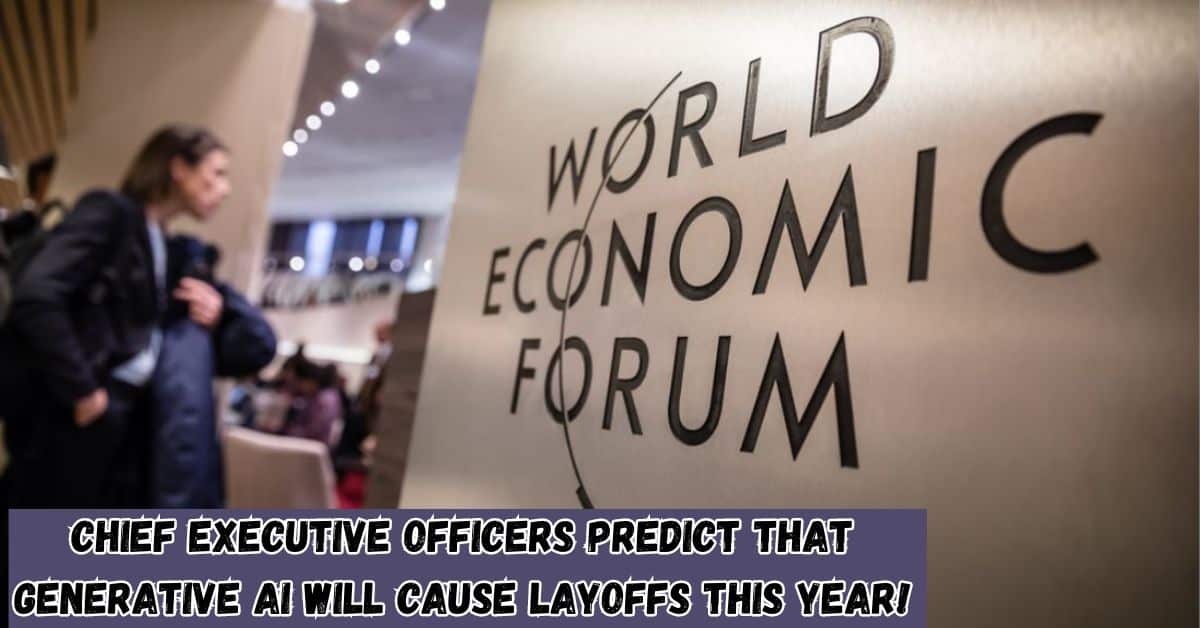As world and business leaders convened in Davos, Switzerland, a report was revealed showing that 25% of worldwide chief executives anticipate a 5% drop in the workforce this year due to the implementation of generative AI.
Prior to this week’s World Economic Forum, PwC polled top directors in the industries of media and entertainment, banking, insurance, and logistics to see if they anticipated job losses due to advanced AI capabilities. Along with technology organizations, engineering and construction firms were the ones least likely to predict layoffs due to automation.
The poll went on to say that 46% of people think generative AI would increase profits in the next 12 months. Generative AI systems can generate human-like language, graphics, and code in a matter of seconds. Nevertheless, 47% of people think the technology won’t make much of a difference.
The theme of the far-reaching implications of AI models on economies and societies will be a significant focus during the annual meetings, according to the findings, which are based on interviews with 4,702 corporate CEOs from 105 nations.
Notable AI executives such as Microsoft’s Satya Nadella and OpenAI’s newly reinstated chief Sam Altman are expected to be in attendance. Many economists anticipate that, when AI becomes more widespread, it will increase productivity, but it will also cause significant disruption in the workforce.

According to the PwC poll, more and more CEOs are looking forward to 2024 as a year of stronger economic growth, but they are also worried about how to deal with breakthrough technologies like generative AI and climate change.
“As business leaders are becoming less concerned about macroeconomic challenges, they are becoming more focused on the disruptive forces within their industries,” stated Bob Moritz, global chair of PwC.
“Whether it is accelerating the rollout of generative AI or building their businesses to address the challenges and opportunities of the climate transition, this is a year of transformation.”
After 32% said they have implemented generative AI company-wide in the previous year, the poll found that more and more CEOs are planning to do so in the next months. Over half(58%) believe it will raise product or service quality in the coming 12 months, and over 70% believe their staff will have to acquire new abilities as a result.
A quarter of US and Eurozone jobs might be automated by the latest AI advancements, according to Goldman Sachs’s prediction from last year. This, in turn, would trigger a productivity boom that would eventually boost global GDP by 7% over a decade.
According to the PwC report, executives are particularly concerned about cyber security and the proliferation of disinformation as potential hazards associated with AI.
The poll indicated that, in the near term, there is less concern about the overall picture. For example, compared to last year, when 40% of directors reported that their company is “highly/extremely” vulnerable to inflation, this year’s rating is much lower at 25%.
Just 38% were of the opinion that the world economy will do better this year, up from 18% in 2023. In contrast to the high hopes for expansion that preceded the lifting of COVID-19 restrictions in prior years, this is a significant disappointment.
The results are in line with expectations that the most severe inflationary surge that affected economies starting in 2021 has subsided, and they coincide with investor anticipation that the US Federal Reserve and other central banks will begin lowering policy rates this spring.
Twenty percent of executives in North America and Asia reported being severely or highly vulnerable to price increases, according to PwC, making them the least worried about inflation among the areas surveyed.
People in Africa were among the most concerned about the potential impact of price spikes on their businesses. Cyber hazards, geopolitical unpredictability, and climate change were ranked lower than inflation and macroeconomic volatility in the poll.
If you found this technological topic to be enjoyable, you might also be interested in the following:



